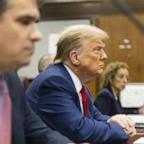Obama warns Wall Street not to lapse into 'reckless behavior'
NEW YORK -- President Obama warned Wall Street on Monday against going "back to the days of reckless behavior" and pressed his case for "the most ambitious overhaul of the financial system since the Great Depression."
Speaking a year after the collapse of Lehman Bros. set off a worldwide financial crisis, Obama took aim at Wall Street firms that received government bailout funds last year but have since returned to profitability — and have set aside huge sums for executive compensation. "The old ways that led to this crisis cannot stand," Obama said in a speech at Federal Hall on Wall Street itself.
Since the panicked days of a year ago, the financial system is "beginning to return to normalcy," Obama said. The Treasury Department is scaling back its support for Wall Street. On Friday, for instance, it ends a program that once guaranteed as much as $3 trillion in money market mutual funds.
Saying "history cannot be allowed to repeat itself," the president urged Congress to pass his sweeping plan to overhaul financial regulation.
The administration proposal would close loopholes in regulation, set up a "systemic risk" council to oversee banks and investment firms considered too big or important to fail, and find a way to close large financial institutions without threatening the broader economy. Obama's proposal would also set up an agency specifically designed to protect consumers from predatory loans and other financial abuses. "By setting ground rules, we'll increase the kind of competition that actually provides people better and greater choices," Obama said.
Raj Date, chairman of the Cambridge Winter Center for Financial Institutions Policy, said Obama's proposal would encourage financial innovations that benefit consumers: "If you don't have clear rules of the road, you can't expect that you will magically get good market outcomes."
Sen. Judd Gregg, R-N.H., warned that Obama's overhaul would "undermine risk-taking, capital formation and entrepreneurship and ... hurt job growth and American competitiveness."




